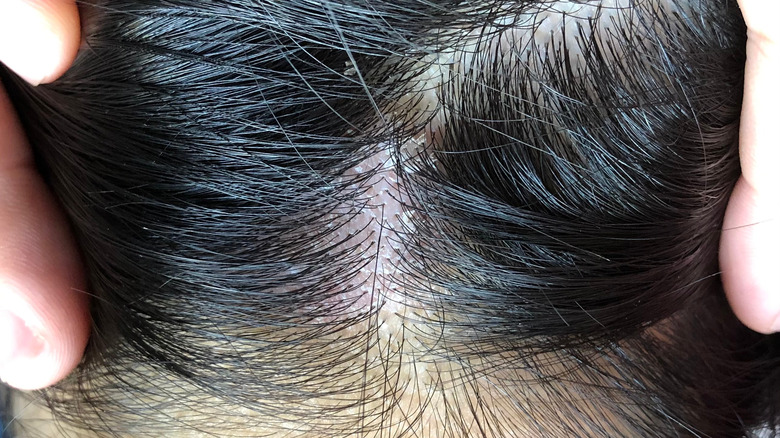How To Tell If You Have Seborrheic Dermatitis Or Dandruff
If you're among the one in two people who suffers from an itchy scalp with flakes, it can be incredibly frustrating (via Northstar Dermatology). Dandruff can lead to spending money on expensive treatments each year, and it can also wreak havoc on your self-esteem. Even if you've accepted the flakes, they still might annoy you. Often, if you have a mild case of flakiness, the right dandruff shampoo and conditioner might be enough to take care of the issue, but sometimes that isn't enough to stop the small white skin particles from dropping off your scalp.
Not only are the flakes unsightly, leaving a dusting on your clothes, but also scalp irritation could indicate a problem other than simple dandruff, according to WebMD. Instead of dandruff, you might have a condition called seborrheic dermatitis. If you think there could be more to your itching and flakes than dandruff, read on to find out how to tell the difference.
Here's the main difference between dandruff and seborrheic dermatitis
According to Northstar Dermatology, experts don't know the true cause of dandruff. They believe that the Malassezia fungus, stress, harsh shampoo and other hair products, and a poor diet help cause the itching and flakes. While dandruff affects about 50% of people, you might find yourself among the one in three people who has seborrheic dermatitis. This condition usually shows up as an inflamed and itchy scalp with flakiness and scaling. A harsh reaction to the Malassezia fungus causes seborrheic dermatitis, and it can occur anywhere on your body where you have sebaceous glands, like your nose, mouth, back, shoulders, armpits, ears, and chest. There's also the possibility that genetics are playing a part.
The best way to tell the difference between dandruff and seborrheic dermatitis is scaling (via Northstar Dermatology). If it's dandruff, you'll only have flakes. A dermatologist can help you with both dandruff and seborrheic dermatitis. If you have the latter, you might find that it has an impact on your quality of life, which makes it important to discuss it with your doctor. Some reasons for a flare-up include stress, hormonal changes, dry weather, Parkinson's disease, HIV, and psoriasis. If you notice flakes or itching, make an appointment to get the right diagnosis and treatment.

